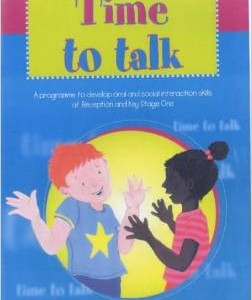Time to Talk: A Programme to Develop Oral and Social Interaction Skills for Reception and Key Stage One
For a child that hasn’t developed their communication skills going to School can be one of the most confusing and exacerbating experiences, on top of this understanding the curriculum, developing friends and learning to co-operate with others will also prove problematic.
What is the approach?
Time to talk has been specifically created to teach and develop social interaction skills and improve oral language skills for children aged between 4-6 years old.
Time to talk contains over 40 sessions which are designed for children who will be seen two to three times each week. The book will also help teachers to develop the basis of interaction with the help of a friendly and approachable character, Ginger the Bear who is a core feature in all of the activities.
The skills which a child can gain include:
- Eye Contact
- Taking turns
- Let’s Practice
- Sharing
- Greetings
- Awareness of Feelings
- Giving
- Following Instructions
- Listening
- Paying Attention
- Play skills
Who can the approach be used with?
Time to talk can be used with children aged between 4-6 who need a helping hand in developing their oral and social interaction skills.
Today, time to talk is used with a range of pupils who find it difficult to interact socially with others, it will also help a child find their voice and improve their oral language skills.
Children who often benefit from this system have:
- Difficulties in expressing themselves
- Difficulty interacting socially with others
- Require assistance with following instructions and paying attention
Who can deliver the approach?
This approach can be implemented by therapists, school/support staff and family members and can be used with individual, groups or a whole class/key stage approach









